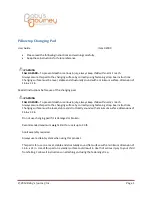
VOT 2; Rev 1.2; EN; 09.07.2013
TKT67C
– Installation and maintenance
24
5. System planning and installation
5.1 System planning
Tapsa Control central battery unit uses the circuit cabling to transfer data between the central battery
unit and the luminaires. This way there is no need for separate data cabling, and the circuit cabling can
be done in the same way as the regular cabling for emergency lighting system.
5.1.1 Luminaire-specific addressable monitoring
The following points should be taken into consideration when planning addressable monitoring:
The luminaires used in the system must be manufactured by Teknoware, and their type code
must end in letter 'K' (For example TWT6081K) or external luminaires fitted with Teknoware
address module. These types of luminaires include the technology that allows communication
between the luminaire and the central battery unit.
The luminaires must be coded with addresses from 1 to 32. The addresses can be selected
freely as long as two or more luminaires in the same circuit do not have the same address. The
coding (circuit no. / luminaire no.) can be marked in accordance with the electrical plan to the
address label delivered with the luminaire.
5.1.2 Circuit monitoring
Circuit-specific condition monitoring allows the usage of any emergency luminaires operating on AC/DC
voltage. However, in case of the fluorescent lamp luminaires, they shall be designed so that they switch
off when the lamp fails. This is because the system measures only the current of the circuit and detects
the failures from the changes in it.
5.2 System installation
The system must be installed according to the electrical plan or work description.
If you use addressable monitoring, make sure that all luminaires belonging to the same circuit have a
different address number (between 1 and 32). Set the address by changing the DIP switch settings.
The DIP switch is located in the data transfer unit or electronic ballast inside the luminaire. The
instructions for setting the addresses are included in the luminaires' installation instructions.
To install the system,
1. Make sure that the main switch is in the '0' position and the battery fuses are removed.
The batteries are always placed in a separate battery case, and connected in series (18 x 12 V) to
the + (red) and - (black) cables reserved for them. The batteries' temperature sensor is placed
between the batteries.
2. Check the polarity of the batteries.
3. Connect the supply cable to connectors 3~ L1, L2, L3, PE and N
4. The output circuits are connected to connectors X1-X7.
The circuit fuses F1-F56 are located at connectors X1-X7. The central battery unit outputs can be
connected as maintained or non-maintained, using the "Mode" wire links in the following way:
Содержание TKT6716C
Страница 26: ...VOT 2 Rev 1 2 EN 09 07 2013 TKT67C Installation and maintenance 26 5 2 1 Parts layout...
Страница 42: ...VOT 2 Rev 1 2 EN 09 07 2013 TKT67C Installation and maintenance 42...
Страница 43: ...VOT 2 Rev 1 2 EN 09 07 2013 TKT67C Installation and maintenance 43...
Страница 44: ...VOT 2 Rev 1 2 EN 09 07 2013 TKT67C Installation and maintenance 44...
Страница 45: ...VOT 2 Rev 1 2 EN 09 07 2013 TKT67C Installation and maintenance 45...
Страница 46: ...VOT 2 Rev 1 2 EN 09 07 2013 TKT67C Installation and maintenance 46...
Страница 47: ...VOT 2 Rev 1 2 EN 09 07 2013 TKT67C Installation and maintenance 47...
Страница 48: ...VOT 2 Rev 1 2 EN 09 07 2013 TKT67C Installation and maintenance 48...
Страница 49: ...VOT 2 Rev 1 2 EN 09 07 2013 TKT67C Installation and maintenance 49...
Страница 50: ...VOT 2 Rev 1 2 EN 09 07 2013 TKT67C Installation and maintenance 50...
Страница 51: ...VOT 2 Rev 1 2 EN 09 07 2013 TKT67C Installation and maintenance 51...
Страница 52: ...VOT 2 Rev 1 2 EN 09 07 2013 TKT67C Installation and maintenance 52...
Страница 53: ...VOT 2 Rev 1 2 EN 09 07 2013 TKT67C Installation and maintenance 53...
Страница 55: ...VOT 2 Rev 1 2 EN 09 07 2013 TKT67C Installation and maintenance 55...
















































